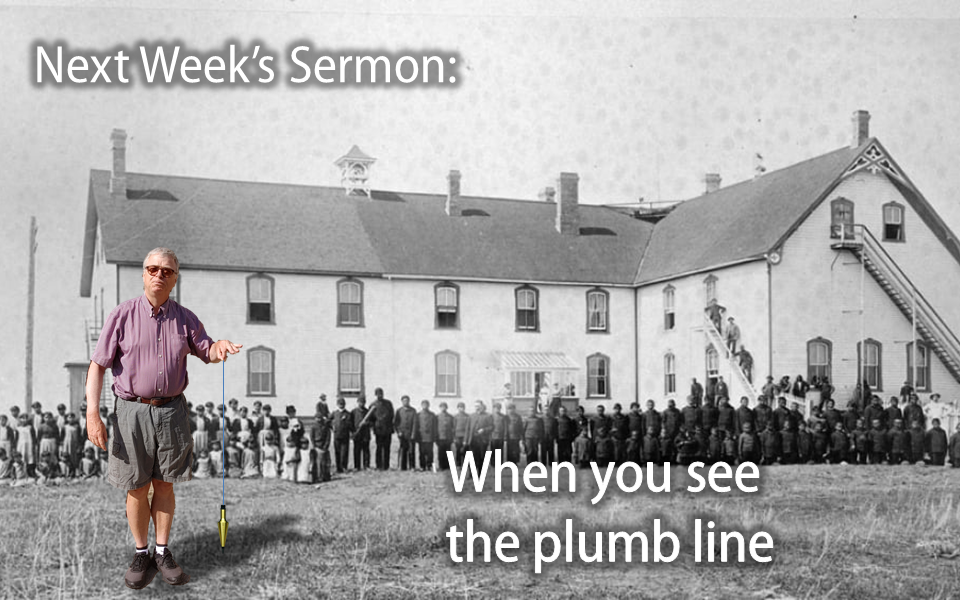Who do you say I am?
Hespeler, 12 September 2021 © Scott McAndless
Proverbs 1:20-33, Psalm 19, James 3:1-12, Mark 8:27-38 (click to read)
You know, there was a time when I looked at the opening passage in the Book of Proverbs, the passage that we read this morning, and I thought that it was an exaggeration. “Wisdom cries out in the street; in the squares she raises her voice. At the busiest corner she cries out; at the entrance of the city gates she speaks: ‘How long, O simple ones, will you love being simple? How long will scoffers delight in their scoffing and fools hate knowledge?’”
I mean, I didn’t think that that was possible. I didn’t think that people would intentionally embrace a lack of knowledge. I knew, of course, that people could be wrong or mistaken sometimes. They might have misunderstood their lessons or been unable to get access to the right sources of information. But I assumed that people, if given the opportunity, would want to know the truth about the world.
Rejecting Wisdom
I realize today how wrong I was. For we are living in a time today when the majority of the population actually has much of the accumulated knowledge of the world almost literally at its fingertips. They can look it all up from credible sources on their phones. And yet, it seems like a growing number of people are simply not interested in knowing what is true, at least, not if it’s going to contradict what they’ve already decided they want to believe.
We are living in an age when people actively choose to get their knowledge about important things like the spread of viruses and the safety of vaccines from random videos on YouTube rather than from people trained in public health and epidemiology. We are living in an age when people are deciding not to do things simply because some authority figure told them they should do it. Once again, it seems that the Bible has found a way to apply very directly to the serious issues that we are facing in our times.
Jesus’ Question

It also reminds me of the time when Jesus turned to his disciples one day and asked them, “Who do people say that I am?” I don’t think that this question was just a matter of idle curiosity. Jesus understood that he was and would continue to be a polarizing figure. He knew that some people would just fail to understand who he was and what he came to do. But he also knew that there were some who would be only too happy to make Jesus what he wasn’t but rather what they desired him to be and what served their own purposes.
What People were Saying
And so that is what he was discussing with his disciples, how there were people who were looking for Jesus to be like John the Baptist and lead the people in a new conquest of the land of Israel. Or they were looking for Jesus to be like Elijah and confront the people who were in charge head on. Or they wanted Jesus to be like one of the prophets. That’s really convenient, of course, because whatever message you wanted to be spoken, you could probably find a prophet who had said something along those lines.
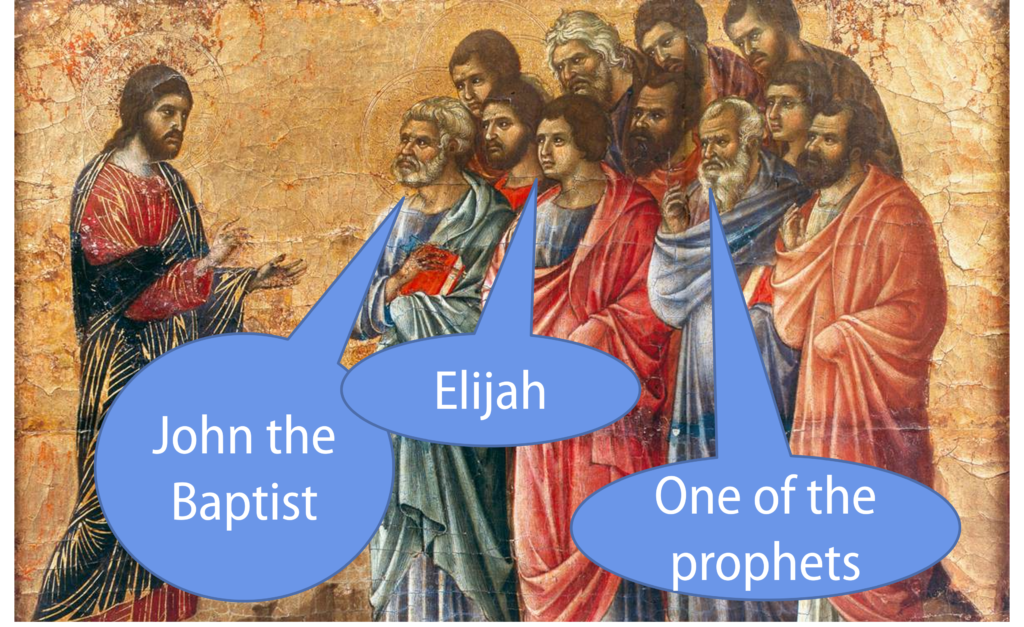
Jesus asked this question, in other words, because he knew very well that people were turning him into whatever they wanted him to be. And I would suggest to you that that is a process that is very much continuing to take place in our world today.
2021’s Most Famous Prayer
Take, for example, what I would consider to be the most famous prayer that has been publicly prayed in our world during this calendar year. I don’t know if you’ve heard about this prayer, but you need to. It was prayed by a group of people on the sixth day of January of this year and you can still go and watch the video of that prayer today. It all started when one of the people present cried out, “Jesus Christ, we invoke your name!” to which the others called out, “Amen!”
And then another man, Jacob Chansley, raised a bullhorn to his lips and shouted, “Let’s all say a prayer in this sacred space,” and immediately begin to lead such a prayer. He invoked the “divine, omniscient, omnipotent and omnipresent creator God.” He thanked this God for the police officers who, in his words, had allowed them into the building (even though the very same video shows a police officer telling all of the people that they needed to leave). Chansley above all thanked God for being able to “exercise our rights, to allow us to send a message to all the tyrants, the communists and the globalists that this is our nation, not theirs.”

Did you catch that prayer? It was, of course, prayed by a man whose face was painted red, white and blue, whose naked chest was covered with tattoos and whose head was adorned with buffalo horns. It was prayed on the floor of the United States Senate chamber by people who were there illegally, most of whom have since been arrested and are facing trial. And yet, they declared that they were there in the name of Jesus Christ. I think I know how those people would have answered the question that Jesus asks in the Gospel.
This September 6th Insurrectionist Jesus
“Who do you people that I am?” “Well,” they would have replied, “we know who you are, Jesus. You are the one who has given to us the divine right to decide how this country is going to be run and to make sure that people who are not like us don’t get any say.” They would have said, “You are the Jesus who made this country one that must be dominated by white Christian men – a country that always will be dominated by white Christian men. And they would have said this without any sense of irony whatsoever, without realizing that Jesus himself was not white and certainly not a Christian nationalist.
And I realize, of course, that those people who stormed the US capital in the name of Jesus, who carried their crosses and Christian flags, are rather an extreme case. Not everyone warps their image of Jesus to make him fit their agenda as much as that. But I do think that there is a sense in which we all do it. We all like to make our idea of who Jesus is speak louder than Jesus himself.
The Nationalistic Jesus
For many people, they don’t have to think about it, they would just answer that question of, “Who do people say that I am,” with a picture of a nationalistic Jesus. They just assume that their Jesus would automatically give reverence to the flag and support to the troops no matter what. They assume that Jesus is on their side in any war or international dispute. Above all they would say that their nation is uniquely blessed by God and so cannot do any wrong.
But Jesus would press us with the deeper question, “But who do you say that I am?” He would perhaps remind us of the time that he said, “My kingdom is not of this world,” (John 18:36) and all of the times when he described a kingdom of God that was over and against this present world's systems. And I’m certain he wouldn’t let us forget his warning that, “Those who live by the sword, die by the sword.” (Matthew 26:52) Yes, it is true that we, as individuals, can love our country and give all respect to those who serve in its armed forces, but when we start to drag Jesus and our image of Jesus into that, I think Jesus would make us look deep into ourselves and ask, “Is that really who you say that I am?”
Supply Side Economics Jesus
Of course, there are others who are only too happy to turn Jesus into a picture of their economic understanding of how the world works. They want a Jesus who says to them that if they are wealthy and prosperous and have good things happening to them, then it must simply be because they deserve it. They must have worked hard and been virtuous. Of course, it follows from that that if there are others who are poor or struggling, it must be because they also deserve it, because they have not pulled themselves up by their own bootstraps like the virtuous people have. Above all, they would say that Jesus is completely on board with their program of amassing as much wealth to themselves as they can.
But, I believe that, to these also, Jesus is asking, “But who do you say that I am?” He is reminding them that he is the Jesus who said, “Blessed are you who are poor, for yours is the kingdom of God.” (Luke 6:20) He is also the Jesus who went on to say, “But woe to you who are rich, for you have received your consolation.” (Luke 6:24) I have no doubt whatsoever that Jesus saw the value in hard work and the people who do it, but he also saw the flaws that were inherent in the system that meant there were many who could profit handsomely from the labour of others while some could never advance given the disadvantages they were saddled with
And, of course, don’t forget that this is also the same Jesus who told the rich man that the only way for him to be part of what God was doing was to sell everything he had and give it all to the poor. (Mark 10:17-31)
Maintain the Status Quo Jesus
“Who do people say that I am?” For many people, the obvious answer to that question is that Jesus is the one who gives legitimacy to the present system of this world and the way things are done. Jesus is the one who makes sure that the system doesn’t change. Even with all of the turmoil we have seen in our society over the last sixteen months, I think many of us are still living with that expectation that at some point things will go back to how they used to be, which is to say, how they should be.
But Jesus turns to us and asks, “But who do you say that I am?” And he would remind us that he is the one who said, “The first shall be last and the last first.” (Matthew 20:16) And there is no way to understand that but that he was saying that he was here to overturn the established order of things. And he seemed to think that that kind of disruption was necessary for the kingdom of God to come into being.
Responding to Wisdom
The Book of Proverbs has this incredible image of this woman who is the personification of wisdom. She is offering to people what we all say that we desire – the wisdom that we need to work through life’s questions and problems. But, amazingly, she doesn’t have any takers.
But I think that I understand what the problem is now. It’s not that people don’t want wisdom, it’s that they don’t recognize her when she calls out because they are seeking for wisdom in all the wrong places – in the easy answers to life’s questions, in the answers that only conform to what they’ve already decided to believe. They especially seem to choose such an answer when it is so readily available on Facebook and Twitter. But if they knew what they were looking for, if they were able to recognize it, wisdom would actually be so easy to find. That is what the Book of Proverbs suggests.
Finding Jesus
It is kind of the same way with Jesus. People often complain that Jesus is absent from our world today. “Oh, if only we could hear his voice, maybe we would find our way through this present crisis!” But what if he’s actually out there standing on every street corner, maybe in the face of a beggar or someone struggling with mental illness or addiction. Maybe he’s right there in that person who’s fallen through the cracks of the system.
The problem is not that Jesus isn’t there in our world, it is that we are so busy looking for the wrong Jesus. We’re busy looking for the nationalistic Jesus or the capitalistic Jesus or the Jesus who will maintain the status quo no matter what.
“Who do you say that I am?” It is the question that Jesus continues to ask every single one of us. And maybe if we can just let go of our ideas of who Jesus is supposed to be and embrace some of the difficult pictures of who Jesus actually was and is, we can start getting somewhere.
Today’s Devotion for People at a Social Distance
What does faith look like in the handoff to a new generation?
Cancelling Jesus?
Watch the sermon video here:
Hespeler, 5 September 2021 © Scott McAndless
Proverbs 22:1-2, 8-9, 22-23, Psalm 125, James 2, Mark 7:24-37
There has been a lot of talk over the last few years about canceling. It is what happens when you have somebody who, for a long time, has been revered in the culture falls from their pedestal. Maybe they are an important historical figure or politician. Maybe they are a celebrated author or actor or businessperson. But then they do something. Maybe they tweet something intolerant or abusive or insensitive. Or maybe they treat somebody else in a way that just seems wrong.
And we all know what happens next. Word of this terrible offense spreads like wildfire through social media along with a rising tide of offense and condemnation. And once the tide has grown large enough, the repercussions begin and often we see the person who has committed the offense losing their platform or maybe their job or paying the price in some other significant way.
“Cancel Culture”
This phenomenon has been given the name of cancel culture in our modern times, which is a name that I will admit I have some trouble with. My problem with it is that people always seem to see cancel culture as something that other people do. But they never seem to see how their own activities of boycotting or demanding somebody’s resignation who they don’t agree with as effectively part of the same kind of culture. That tells me that, often the people who use this term are really only using it as a tool to put down people they disagree with and are not really trying to create a better culture.
But, for better or worse, the term does seem to have become a part our modern language. So maybe we ought to understand it and try to see what can be done with it. So let me suggest a bit of a case study.
A Case Study
Let me give you a real-life case of a very important and highly revered religious leader. I’m talking about the kind of guy that commands the love and devotion of millions. In fact, so much is he revered that many of those followers would think of him more as a God than as a man. And let’s say that I tell you that a very reliable report has come out that this man was in a twitter conversation with a woman of a different ethnic group. She had come to him and asked for his assistance with something really important to her and he turned her down.

But wait, that’s not the terrible part of the story. I mean, somebody might have all kinds of good reasons not to come to the aid of somebody in need. It might be a bad look, but it’s not necessarily evil. No, it wasn’t the fact that he turned her down, it was how he did it. What if he turned her down by tweeting back, “Let the children be fed first, for it is not fair to take the children’s food and throw it to the dogs.”
Did he Just Call her a Dog?
Ouch, can you imagine what the cancellation brigade might do with a tweet like that? They would ask, and quite justly when you look at the context, “Didn’t he just imply that the people of his own ethnicity have priority simply because of that ethnicity? Even more important, didn’t he just call the people of her race dogs (which is a particularly insulting slur in that culture)? And finally, and the most damningly, isn’t there a word for a female dog, a word you wouldn’t even say in public? And didn’t he just personally call her that?” Oh, I can just imagine the culture warriors going to work, spreading the news and doing whatever they can to cancel the person who would have tweeted such a thing.
So, what do you think about that particular case study? It’s a big problematic, isn’t it? It is especially problematic because, of course, you have all already figured out which public figure I am talking about here. I am talking about something which, according to the Gospel of Mark, Jesus actually said. And there really is very little question that that is what he meant.
Defending Jesus
This story of Jesus and the Syrophoenician woman is one that is kind of inescapably problematic. It has been for a long time. One way you can know that is is because, for a long time, people have been trying to defend Jesus and his words in the story. One of the common defenses that you will hear is that maybe Jesus didn’t really mean it. You know, he just said it in order to test the woman, to see if she had enough faith to challenge him.
But I got to say, when it comes to defenses, that is a pretty thin one. After all, isn’t it the same defense that you have heard so many times when a powerful executive or public figure gets caught doing something horrible like sexual harassment? “Oh,” says the powerful man, “I was just testing her to see if she would do the right thing by turning me down.” That’s right, I think that most of us would be pretty skeptical about such an explanation if we heard it today, and I really think that it is no different in the case of Jesus.
A Racist Attitude?
So, what is going on in this story? Is Jesus reacting to this woman in a racist manner? I suspect the inescapable answer is probably yes. And I realized that that answer might mess with some of your understandings of who Jesus was and what he represented. We do confess, after all, that Jesus was the Son of God, the one through whom God was and is uniquely present in this world. And yet, at the same time, we also confess that Jesus was and is fully human. And, given that that is a logical inconsistency, we do sometimes have a bit of trouble putting those two confessions together.
After all, we consider, if Jesus was fully divine then he must have known everything. That means that he must have known that it was racially insensitive and offensive to suggest that that woman was a dog. He must have known how that would have felt to her. That is actually a misunderstanding of the divinity of Jesus as presented in the Gospels, where Jesus is not presented as being omniscient. But that is how we tend to think of it all the same.
And yet, at the same time, as someone who was fully human, Jesus grew up in the world, in Nazareth of Galilee, where he doubtlessly heard people putting down other people because of their ethnicity. And if, his whole life, Jesus had heard his parents and every person in his life that he respected casually refer to Syrophoenicians as dogs, would it not be the perfectly human thing to just casually pick up such attitudes and ways of speaking? Of course it is! I know that is what it is to be human because that is exactly what happens to each and every one of us as we grow up and uncritically adopt similar attitudes.
A Sinless Christ
So, I really don’t feel as if it is all that surprising that Jesus should have picked up certain racial prejudices or attitudes. After all, the Bible does teach that Jesus was tested and tempted just like any of us, and yet was without sin. And so, having been exposed to such attitudes, he could well have carried them with him at least until such time as he was exposed to a living and breathing Syrophoenician. It is only at that point, I would suggest, that acting on such a prejudice would be a sin.
So the question is, if Jesus was fed racist attitudes by the society that raised him, why wouldn’t his initial reaction just have been to act on those attitudes? And if that’s what Jesus was doing, should he be canceled for that?
No. I would say this not just for Jesus but for anyone who has been in that kind of situation. And I suspect we’ve all been in that kind of situation. We have all been fed certain attitudes that may be hurtful to others by the culture around us. That’s not on us; that is on the culture. No one should be canceled for just one tweet or statement. Now, when such a statement is part of an ongoing pattern or somebody absolutely refuses to learn from the hurt that they cause, that may be a different matter. But we all make mistakes, and we all get things wrong; that is a big part of what it means to be human.
What Matters is What Comes Next
So what matters in Jesus’ case is not his initial statement so much as what comes after. And what comes after is that the woman challenges him on what he has said. “Sir,” she says, “even the dogs under the table eat the children’s crumbs.” She knows that what he has just said to her is hurtful. But she also knows that she’s not there merely for herself. There’s something much bigger at stake than the racism that people like her sometimes experience at the hands of Judeans. So, she actually embraces the derogatory term and turns it back to Jesus in a way that allows him to hear what his words sounded like to her.
In many ways, she is the hero of this story. You just have to admire her chutzpah. We could all probably learn something from her when we find ourselves in a position when people do or say something that they might not realize is hurtful to us.
We Often Double Down
But you know what the human reaction to that kind of situation often is. When we are challenged by somebody in the way that this woman challenges Jesus, our automatic reaction is often to get our backs up. Who wants to admit that they are wrong? We see this kind of thing all the time in our society.
For example, you can give some people all the evidence in the world about why they should get the vaccine or why they should wear a mask, and they will resist learning anything new about it. In many cases the more reasonable a case you make, the more irrational the response you get. People don’t like being wrong and they will actually go so far as deluding themselves to avoid admitting it.
But here is where Jesus truly stands out – where his response goes beyond what is simply human to give us a demonstration of what it might mean for him to be divine. Jesus does not get defensive. He doesn’t try and cling to the idea of Judean ethnic superiority that he has been fed all of his life. He learns and he grows in his understanding of this woman who, up until this moment, was merely an ethnic stereotype to him.
The Importance of Incarnation
I do believe in the mystery of the incarnation – the teaching that Jesus was and is, at one and the same time fully human and fully divine. But I also believe that one of the key reasons why the incarnation was needed was in order to show us where, in this world, the human can intersect with the divine – where it can happen for any of us.
We all make mistakes. We have all of us picked up from the culture around us and from our families and others who have formed us ways of looking at the world that are wrong or hurtful. There is nothing extraordinary about that. It is what it is to be human. That is why indeed I do not believe that we ought to “cancel” people for their simple mistakes or their failure to see the flaws in the worldviews that were passed onto them.
The real question is how do you react when you suddenly realize that you might be wrong or, even more importantly, when someone confronts you with the reality that the attitudes you have inherited uncritically are actually hurting people. What do you do then? Oh, that can be so hard. It can feel as if someone is attacking you and you want so much to fight back and defend yourself. I guess my question for you today is to ask yourself how willing are you to follow the example of Christ – the example of his divinity – and not do that? How willing are you to re-examine the worldview you were given as painful or as confusing as that might feel? There are times when I feel as if the very future of humanity itself may hang on the answers to those questions.
But Jesus has already shown us the way and, in doing that, has shown us where the heart of God lies. Isn’t it about time that we started to learn from that?
A Gleam Glows in the Gloom of the Grave
Hespeler, August 1, 2021 © Scott McAndless – Communion
Exodus 16:2-4, 9-15, Psalm 78:23-29, Ephesians 4:1-16, John 6:24-35
If you are like most readers, when you come to this passage in the Letter to the Ephesians, you kind of scratch your head. “When he ascended on high he made captivity itself a captive; He gave gifts to his people.” I mean, that part is weird enough. In the middle of a discussion about how Jesus gives gifts to the people of the church, the apostle pauses to pull out this obscure verse from Psalm 68, a psalm about how God fights against and destroys the enemies of Israel and he doesn’t even seem to have translated it correctly.
But then the passage goes from just plain weird to something that almost seems to defy reason. The writer begins to explain what he thinks the passage means: “When it says, ‘He ascended’, what does it mean but that he had also descended into the lower parts of the earth? He who descended is the same one who ascended far above all the heavens, so that he might fill all things.”
What? How does that necessarily follow? I mean, I will accept the great teaching of the philosopher Tyrone Davis who said, or rather sang, “What goes up, must come down.” But I cannot think of anyone, apart from the writer of this letter, who would declare it obvious that what goes up must have previously descended into the very depths of the earth, but that is what he says.
What did they know?
So, what is going on in this passage? The only way to really make sense of it is if the people who first received this letter knew some things that we, as modern readers don’t know. The fact of the matter is that, in this passage, the writer is referring to a story that the Christians in Ephesus and, indeed, Christians in most places at that time were already familiar with. It is a story that was very popular throughout the early Christian Church but that, for some reason, never really made it into the Bible apart from a few obscure references here and there. It even got a mention in one line of the Apostles’ Creed. But it was largely forgotten by the church in the ensuing centuries.
Even if it got a mention in a creed, it was not really a doctrine, it was just a story, a story that the church told to make sense of something that troubled them. Whether they actually took the story literally or not, I’m not sure. But, however they took it, it really helped them to work through what they believed. So I think that you really should know this story, it probably went like this.
The Gloom of the Grave
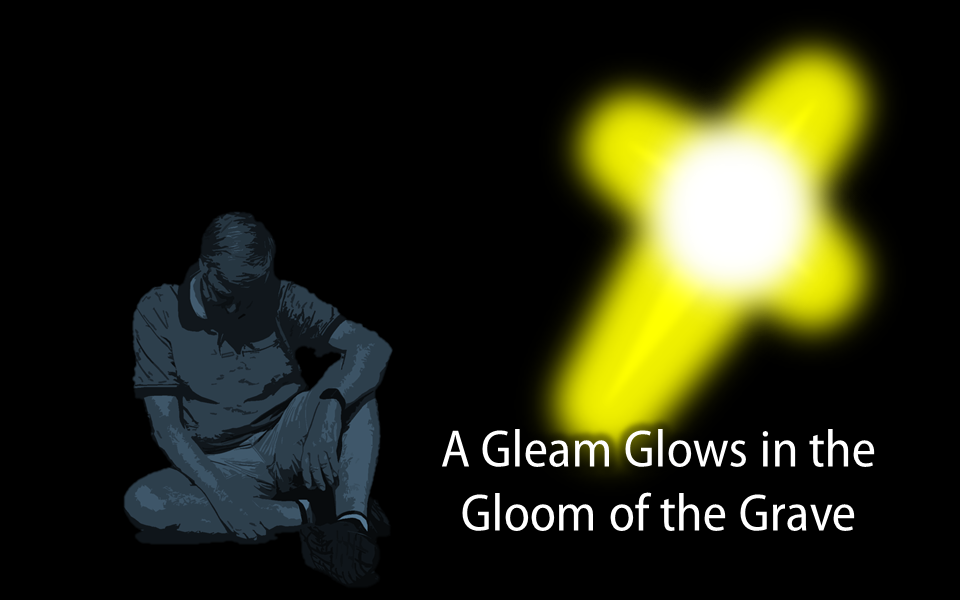
There is nothing but gloom as far as the eye can see. And that is the right word for it – gloom. You can’t really call it darkness because that would be something – something to notice, something to care about. Darkness is an absence of light, but this is an absence of meaning.
And in the midst of the gloom lie the souls of men and women. They had once known the pleasure of life, had felt the touch of the wind on their cheeks, the warmth of an embrace and the delight of a good laugh that starts in your belly and shakes your whole body. But all of that is now, for them, little more than a fading memory.
Three Souls
Here, every day is exactly the same as the last and so time has no meaning. But throughout that immeasurable passage of time, some of the souls come to huddle together, finding something like a connection in their fading memories of the life that they had known. For example, see over here where there is a huddle of three figures. They all come from different eras, but, down through the centuries, they have found some sort of kinship together. They have no names anymore, not even any real sense of identity. But they do have stories. They are stories of defiance and self-righteousness. The stories are all that they have, so they tell them over and over again until they hate the sound of each other’s voices and even of their own. But there is nothing else to do.
From the Time of Noah
One is speaking now in her raspy voice. “I remember how we used to laugh at that old fool, Noah. He used to go on and on about how the rains were coming, how that ark of his was the only way anyone could escape. But we told him, we told him that that ark was just some government conspiracy that was meant to control us and take away our freedom. We told him that the flood was just like the regular seasonal rains and it surely wouldn’t affect young and strong people like us, just maybe the old and infirm. I remember saying that it was my choice if I wanted to get on an ark or not.
“And I suppose that he was technically right. When those flood waters came, there really was no escaping them. But, man, did it feel good to make fun of silly old Noah. You should have seen the look on his face when he closed that door, we really showed him!”
From the Time of Babel
The man beside her isn’t listening to a word she says. He’s busy reliving the high point of his own glory days. “I was right there,” he cries. “I helped to carry the final load of bricks right to the top of that tower on the plain in the land of Shinar. And we knew that when we had set those final bricks in the mortar, we would have done it. We would have reached the heavens themselves and taken our place among the gods.
“Of course, it was just at the moment that everything went wrong. I turned to the man beside me to say what was on my heart. ‘This is it,’ I cried, ‘this the day when we take control of everything and can use it to serve ourselves.’ But the man looked at me as if he hadn’t understood a word that I’d said – which indeed he hadn’t. Then he responded with nothing but gibberish and I knew that we were undone.
“It all fell apart after that. We could never come together, never organize anything after that. But, for one brief moment, it seemed as if anything, even heaven itself, was within our grasp. I will always have that, and I will never let go of it.”
The Rebellion of Korah
The third member of the group is, if possible, even more despondent than the others. But he is no less fixated on his particular act of rebellion. “We just felt as if Moses was a little bit too full of himself,” he mutters. “Why should he be the only one who gets to decide what to do? Why should God only speak to him? Were we not also the children of Israel? Were not men like Korah and Dathan also princes among the tribes? Why should we not be able to offer incense within the tabernacle?
“And so, yes, we stood up for what we deserved. We demanded that Moses be taken down a peg or two. I still believe it would have created a better balance. But, no, before I knew it the ground began to shake and then opened up beneath us. The next thing I know, here I am and here I remain. But I will never let go of my belief that we were in the right.”
A Gleam in the Gloom
That is sort of just what it’s like in this place. No one can quite remember anything good or kind, but each one has some grievance or some memory of failed rebellion that he or she just can’t let go of. They all play them over and over in their minds until it is a kind of self-inflicted torture. But, since the only alternative they feel like they have is to give into utter meaninglessness, they cling to the self-inflicted torture. And so it is. As I said, every day is alike and absolutely nothing pierces the omnipresent gloom.
Except, what is that? Over there, in the distance? It is something that is not supposed to happen here. It is an event! And they are all so unaccustomed to even the possibility of anything happening that they all just fall silent with a total lack of understanding.
A Figure in the Light
But even more confusing is the nature of the event. It is light, something whose very presence in this place is so unthinkable that they have forgotten the word for it. All they know is that there is something assaulting their eyes, something so bright that it burns them, burns deep into their brains. And yet, somehow they just can’t stop themselves from looking towards it. And so it is that, through squinting eyes, they begin to perceive that there is something in the light, or rather that there is someone, no it is someone who is the light.
He is wounded. The blood drips from the places in his hands and his feet where he has been pierced. Another wound gapes in his side. And, on his head, a number of smaller wounds bleed that might have been made by sharp thorns. And yet, despite the wounds and the evident loss of blood, he does not look weak in any sense. On the contrary, he has all the strength and adrenaline of a man who is just won a hard-fought contest. The sense of power and victory that radiates from him is so powerful that they all turn to him expectantly.
A Message is Preached
He begins to speak. He speaks of freedom and victory. He tells of how the power of death, the power that keeps all of these souls in prison in this gloomy place, has been defeated. That power thought that it had taken him as well but it was wrong and he has come here to proclaim that the power of death has been broken forever and ever.
“And so, my sisters and brothers, my friends from all through the eons of time,” he continues, “you are free! There is nothing that needs bind you here now. In fact, the only thing that did bind you here were the grievances and the acts of rebellion that you have held on to, clinging to them because you have nothing else.
“But today something has happened that means you no longer have to cling to them. The love of God has been demonstrated like it has never been demonstrated before. It is a love that has brought God into the suffering of humanity in this world. And because such love is able to overcome any barrier, you can all let go. Nothing need hold you in this dreadful place anymore.”
The Procession of the Captives
And with that, the souls of the dead began to stir. They suddenly find that the chains of regret and fear, of remorse and failure, of grievance and rebellion are like nothing. They shake them off and they embrace a love that is so fierce and so pure that it makes them feel like young people dealing with their first brush of passion. They stand up, all of them, a mighty host. And the victorious conqueror, knowing that they are with him, turns and leads them all as they form up, rank upon rank, in the shape of a cross.
And as they emerge from the depths of the earth, a great cry echoes from the heavens: “Have you done it? Have you preached to those that sleep?” And from the throngs of souls, thousands upon thousands, who form that great cross comes the answer, a mighty “Yes!”
The Story the Church Told
Now, I will admit that I may have put some of my own dramatic flourishes on it, but that is the story that was told in the early church. It was the story of how, following his crucifixion and prior to his resurrection, Jesus descended into the realm of the dead to preach to those of all previous generations. We know that they told the story because, even if we don’t have the full text of it, we can find references to it in that passage I read from Ephesians. It is also mentioned in the First Letter of Peter which says that Jesus “went and made a proclamation to the spirits in prison, who in former times did not obey, when God waited patiently in the days of Noah.” But that is it, those are the only references that made it into the Bible.
But it is also a story we can find references to elsewhere. There’s a line in the Apostles’ Creed, perhaps the oldest creed of the church, which only really makes sense if you know this story – the line between Jesus’ death and resurrection where it says that, “He descended into hell.” Finally, there is also a gospel, known as the Gospel of Peter (though nobody thinks that it was actually written by Simon Peter) that does include that rather dramatic final scene that I just ended with when the triumphant Christ emerges from the grave followed by a cross that speaks and answers the heavenly question, “Have you preached to those that sleep?”
Why did they Tell this Story?
So the story was known and it was popular, even if it was subsequently forgotten and mostly left out of the Bible. But I guess the question is, why did they tell the story like that? Again, I’m not sure that they took it as literal truth. But I do think that they told the story to help them grab hold of what they saw as an essential truth about Jesus. They knew what they had experienced in Jesus. It was love – love so powerful that it could transcend even the bounds of time. Because of that, they believed that the event of Jesus’ death was an eternal event that could have an effect on all people in all times.
But that kind of concept of timelessness is pretty hard to grasp, and so people need to tell stories to make sense of it. And so, I believe, they told this particular story in order to understand how the love shown through the crucifixion of Jesus could be so powerful that it could overcome the resentment, rebellion and regrets even of those who had lived in ancient times.
David’s Walk on the Roof
Hespeler, 25 July 2021 © Scott McAndless
2 Samuel 11:1-15, Psalm 14, Ephesians 3:14-21, John 6:1-21 (click to read)
For centuries, Western Christianity was pretty sure that it knew what was going on in the story of David and Bathsheba. It was plain enough to see if you looked at the art and read the literature or if you listened to the sermons that were preached. It was obvious, everybody thought it was obvious, that Bathsheba was to blame – that she had intentionally set out to seduce David and lead him astray.
The scene where David sees Bathsheba bathing, was one of the classical scenes painted by many a western artist. And every one of them is the kind of painting that you probably wouldn’t show in a church because Bathsheba is always oozing with sexuality and seduction, she has clearly set out to target David with her feminine wiles.
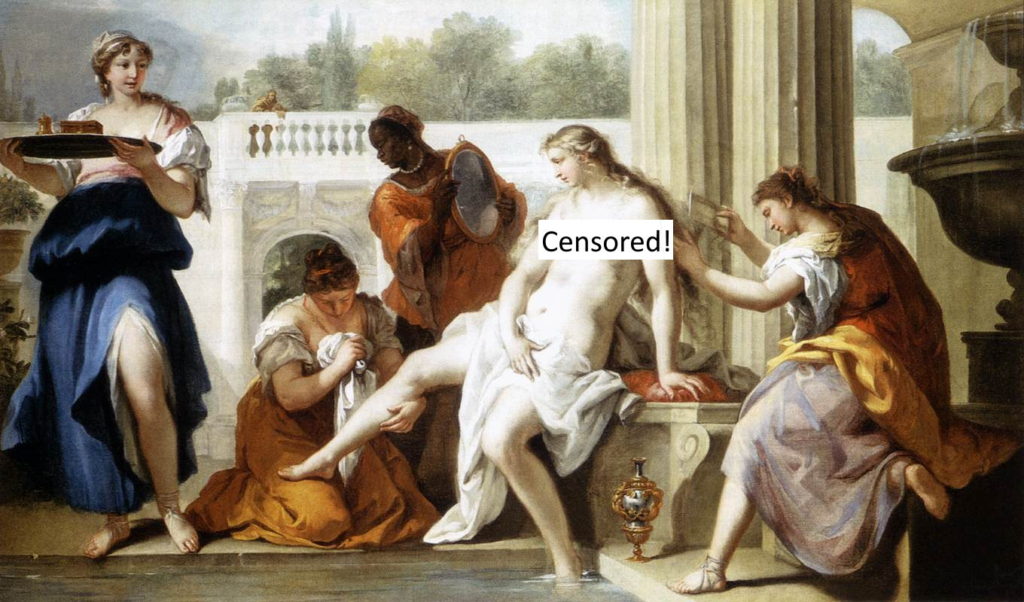
Leonard Cohen’s Take
That was the story and remained the story at least until 1984 when Leonard Cohen wrote what has probably become his most famous song: “Hallelujah.” The song doesn’t name Bathsheba in it, though it does name David so the reference is pretty obvious when Cohen writes, “Your faith was strong but you needed proof. You saw her bathing on the roof. Her beauty and the moonlight overthrew ya. She tied you to a kitchen chair, She broke your throne, and she cut your hair. And from your lips she drew the Hallelujah.”
That verse illustrates well how the story has been heard down through the centuries (at least, if you leave out the little bit where he makes reference to Delilah cutting Samson’s hair). It portrays David as the hapless and impotent victim while Bathsheba is the active one. David has strong faith but apparently just has a weak moment. She is the one who overthrows him, who breaks his throne.
Most of all, of course, she is out there bathing on her roof where she obviously knows that David is going to see her and be entranced. I love that Leonard Cohen song and where he went with it. But, in his references to the story of David and Bathsheba, he really did not stray far from the typical reading of the story that had persisted in Western society for a long time and still persists in many ways right up until today.
Another Story
And there is a reason why the story has been read in that way. It is not, as I intend to show you, because that is what the story actually says in the Bible. It’s because of another story that has long been told in Western society about men and women and how they relate to each other. It is a story that declares, for one thing, that men, at least if they are real men, have a natural drive that makes them aggressive and dominating. This drive is so powerful that, when presented with something alluring, they practically cannot control their response. This is the myth of male sexuality, and it is a myth that is reinforced every time you hear somebody say, “Boys will be boys,” and try to explain away aggressive or abusive behaviour.
At the same time, a story is told about women. The story is that women do not have the same kind of intense drives. Therefore, women need to take on the role of making sure that men are not overstimulated. They are encouraged to dress modestly and not revealingly, the idea being that if a woman shows too much skin, it is her fault if a man responds with sexual aggression. After all, he can’t control himself, but presumably she can.
A False Story
And I want to be clear here that that story is pure bunk. Men and women might feel their drives and desires a little bit differently, but there is no difference in intensity. Even more important, both men and women are quite capable of controlling their response to stimuli and of acting in a way that respects the autonomy of others. No one is powerless to stop themselves from harassing or abusing somebody else.
But that is the story that we have kept telling ourselves for a very long time with the predictable result that, when somebody is raped or harassed, the victim is often the one who gets all the blame. That is why we often ask what she was wearing or why she was where she was. It is why we are often more interested in her sexual history than in his. Meanwhile, the aggressor is often able to find some way to justify his (and yes, it is usually his) behaviour.
And somehow that Western story of the relationship between the sexes got read into the story of David and Bathsheba with the result that we have come to see things in that story that were never part of the original text.
Where was she Bathing?

Take, for example, the question of where Bathsheba was taking her bath. Everybody just knows that she was taking it on the roof of her house, that is to say that she was taking it in a place where she knew that David might see her because she intended to be seen. Isn’t it what Leonard Cohen sings in his song? But he certainly didn’t invent that idea. As I said, Western art has delighted to portray this particular scene down through the centuries, and you can be sure that that is exactly where the artists have placed Bathsheba, on her roof.
So, we all know where Bathsheba was bathing. There is just one problem, that is not what it says in the text. This is what it says: “It happened, late one afternoon, when David rose from his couch and was walking about on the roof of the king’s house, that he saw from the roof a woman bathing; the woman was very beautiful.”
Who is on the Roof?

Who was on the roof there? Well, David of course! Actually, it doesn’t say where Bathsheba was bathing, but the obvious thing that we are supposed to assume, given the practices at that time, is that she was bathing where women would normally bathe at that time and in that culture. She was bathing in a closed courtyard, either the courtyard in the centre of her own house, or perhaps she is in a public courtyard that was maintained exclusively for women in the city for their monthly ritual bath that was required under the law.
Whichever kind of courtyard she was in, however, it was considered to be private space where she would be hidden from passersby on the streets. She certainly wouldn’t have been seen from the roof of any ordinary neighbouring house.
David’s Height Advantage
So why could David see her? Well, obviously because he didn’t live in any ordinary sort of house. His wealth and power meant that his palace towered over all the houses in the city so that he could peek into any courtyard he liked. And the suggestion of the story seems to be that, when David was feeling restless, he liked to go up on the roof of his palace and pass his time peeking into the houses of his neighbours – perhaps specifically looking for women taking their monthly ritual baths! So there really is no question; Bathsheba was doing nothing to entrap David’s gaze. David, in fact, was actually seeking to direct his gaze where it really didn’t belong.
Bathsheba’s “Consent”
But there is another part of the story where people have traditionally sought to blame Bathsheba and that is in the fact that, when David sends for her, she goes to him. Surely, it has been suggested, this is an indication that she had been seeking to ensnare him all along. If she didn’t want it, she should have just said no. Since she went, she must have consented.
But you only need to think for a moment before you realize that it is much more complicated than that. It says that David sent messengers to her. Well, who did he send? Did he send one of his warriors with a sword strapped to his side? One of his bodyguards, a muscle-bound enforcer dressed in leather? If you were a woman living alone in your house and you were confronted with a messenger like that, how free would you really feel to say no?
To be honest, even if David sent the mildest of messengers that he could find, Bathsheba would not have felt the freedom to say no because, no matter who the messenger was, she knew the kind of power the sender of the message had. She knew that he had the power to punish her and even to kill her if she said no. And any consent that is given under those kinds of conditions is not genuine consent. The reality is that Bathsheba had no opportunity and no power to say no.
Let’s Call it Rape
And so there really is no doubt about what David did to Bathsheba. We’d call it rape today. By every modern legal definition, that is what David did to her. The definition was a little bit different in ancient Israel where power of consent did not actually belong with the woman, but, even there, there is no escaping that that is what David did. And the Bible really was never ambiguous about that. Indeed, it tells us that the prophet Nathan confronted David with that very accusation.
So, I think it’s plain to see that when you examine the story of David and Bathsheba closely, it really doesn’t say what western society seems to have decided a long time ago that it says. That, for me, is one of the really powerful things about the Bible. It has this way of correcting our willful misinterpretations
Misusing the Bible
We often act like everything the Bible says has always been settled. “The Bible said it, I believe it and that settles it,” the argument seems to go. And people have used that approach to the Bible to support horrible things. The institution of slavery, people confidently taught, was right and good because that was how the Bible said it should be. The Indian Residential School system was a good thing, preachers taught, because the Bible taught that these people were merely savages that needed to be converted, by force if necessary. And women were evil temptresses who needed to keep their sexuality under control because the Bible said that Bathsheba led David astray by bathing on her roof.
People will indeed use the Bible to support all kinds of things, even evil things, that they have already decided to do. But the wonderful thing about the Bible is that it is always there, the original text still accessible, and we can always go back and look at the story within its wider context, and we suddenly realize that maybe these things were not quite as clear cut as we were taught.
Repentance
So I think it is time for us to repent of some of the things that we have said that the Bible said about sex, sexual assault and rape. Let me declare it here and now, women are not responsible for the sexual sins of men. We are, each one of us, responsible, no matter what the situation, to treat other people with respect as human beings created in the image of God. Our teaching around sexual assault should not be that women need to be modest or cautious, it needs to be that men must be respectful of the autonomy and value of women and of all.
We also need to teach that those who have more power, like David represented by his lofty palace had more power, need to be even more careful about respecting others. The greater your power, the greater your responsibility. There have been far too many stories of men, in particular, who have amassed power in this world – movie producers, comedians, politicians and many others – who have gotten away with abuse, harassment and rape simply because of their position. That needs to change.
And really the church should be at the forefront of asking for that change. But the problem is, there have also been all kinds of stories of powerful men in churches – pastors, teachers and other leaders – who have been doing exactly the same thing. Clearly the church is not immune from this problem, and we need to stop pretending that it is.
So, let us not fall into the trap of thinking that, just because we’ve always been told that this is what a certain passage or story from the Bible means, that is necessarily true. Why not let the Bible speak for itself. And where we have gone wrong, and where our interpretations have led to people being hurt and victimized, let us not fail to repent and to make the necessary changes.
I Will Make you a House
Hespeler, 18 July 2021 © Scott McAndless
2 Samuel 7:1-14, Psalm 89:20-37, Ephesians 2:11-22, Mark 6:30-34, 53-56
It just seemed obvious that that was what needed to happen. It was the necessary next step. For so much of their history, the people of Israel had lived an unsettled life. They had been displaced from here to there, first living as nomadic shepherds in the Levant, then taken away and made to live as slaves in a foreign land of Egypt, and then, even when they were released from Egypt, they ended up wandering around in the wilderness for forty years. So it only seemed right and sensible that, if they had a God who had chosen them and whom they had chosen, that such a God would not be tied down to one place either.
The Ark of the Covenant
And so the God that they encountered and came to know during those years was with them in many different locations. Being human, they still needed some way to focus their worship of such a God, and so, on God’s instructions, they created something. They created a box, a beautiful box covered in gold. And on the top of that box they built a seat.

Oh, it was a very fancy seat. It was constructed out of golden cherubim, unearthly winged creatures, but that did not change what it was. It was a chair, a throne, and they believed that their God would sit upon that throne. They couldn’t see God sitting there. God was invisible, and so insistent on not being seen that it was forbidden to make any image of God. But even if they couldn’t see it, that throne was the sign and symbol of the presence of their God with them.
But actually, the most important feature of the golden box, which, for some reason, we have come to call an ark, was on its sides. On its sides were fixed golden rings. And those rings were there so that you could pass long poles through them in order to carry God’s portable chair from place to place. Everything was designed for mobility. And whenever the box was put down in one place for a while, they would just pitch a tent to keep it in.
David Brings Stability
And that was how they knew their God. And that made sense to them. They were people without roots, so why did their God need any? And this continued to work for them even after they had entered into the Promised Land and began a more settled existence because, even then, leadership kept on shifting and changing and there always seemed to be some group or another coming along and invading or pillaging.
But when David established his kingdom and there was finally a period of relative peace and security, it seemed clear that it was time to make a change. So once David had established an administration and built a palace, the obvious next thing to do was to build a permanent residence for the God of Israel. In fact, this was so obvious that Nathan, the prophet and the man who never hesitated to question or challenge the king’s ideas, didn’t even have to think about it. He just said, “Go, do all that you have in mind; for the Lord is with you.”
Our Need for Buildings
And I think we can all understand that. When the Christian Church first emerged in the years following the death and resurrection of Jesus, it did not meet in what we would recognize as church buildings. They met in the homes of members, on factory floors and sometimes in open spaces on the edges of cities. The Letter to the Ephesians that we read from this morning was written to a group of churches that met in such places. They were an unsettled people – a people who lived mostly on the edges of society, so it kind of made sense that they would meet with their God in the many and varied places where they lived out their lives.
But something odd did happen to the church at some point. It didn’t happen everywhere all at once, but as the decades and then the centuries went by, in various parts of the empire, the church did find a certain measure of stability. There were local officials who tolerated them, even liked to have them around, and they offered to the church a certain amount of protection. And no sooner did that sense of being settled come, than churches began to construct buildings as special houses where they could experience the presence of God. They felt exactly the same impulse that David had felt, and, like Nathan, they never really even questioned whether it was the right thing to do.
Suddenly Churches Everywhere!
And then in 313 AD, Emperor Constantine finally made Christianity legal everywhere and there was no turning back. All of a sudden, such worship houses were being constructed everywhere and each one made more beautiful and elaborate than the next. And so it went from there with every church of every kind deciding that, if they wanted to encounter God in the midst of their settled life, what they needed was a special house built for that purpose. And that story culminates, for us, with the arrival of Scottish settlers in this place and their decision to build this beautiful house to encounter God right here in Hespeler.
But should we Just Assume?
But all that time, like I said, everyone just assumed, like David and Nathan, that it was the right thing to do. We enjoyed living a somewhat settled life in a house, so surely God would appreciate that as well. But David and Nathan forgot something, something that I think we often forget too. They forgot to ask what God actually wanted.
But God told Nathan anyways. The message came that very night. It doesn’t say whether Nathan was awake or asleep, but I’ve always imagined that it came in the form of a very troubling dream. But however it comes, God’s opinion is made very clear. “I have not lived in a house since the day I brought up the people of Israel from Egypt to this day, but I have been moving about in a tent and a tabernacle. Wherever I have moved about among all the people of Israel, did I ever speak a word with any of the tribal leaders of Israel, whom I commanded to shepherd my people Israel, saying, ‘Why have you not built me a house of cedar?’”
God neither desires nor requires a house. This could not be made clearer. It doesn’t matter that the situation of God’s people has changed. It doesn’t matter how settled and secured they may feel, God does not require permanent housing in order to relate to those people wherever they may be.
So that is the first part of God’s answer. But I would note that it is not the whole answer. In fact, by the end of Nathan’s vision, we learned that God will allow for the construction of a temple. This is because God recognizes that, while God doesn’t need a temple, the people who are now living a more settled existence, just might.
Something Else Needed first

But there is something that must come first, and this is the stunning surprise that comes with Nathan’s vision. You see, David has just said that he wants to make a house for God, but God turns that around and says instead that God wants to make a house for David. “Moreover, the Lord declares to you that the Lord will make you a house. When your days are fulfilled and you lie down with your ancestors, I will raise up your offspring after you, who shall come forth from your body, and I will establish his kingdom.” David is interested in making a house of cedar, but God requires a house made of people, that is to say a dynasty, first.
What does that tell me? That tells me that God is much more interested in building up people than architecture. That tells me that God is much more likely to place God’s glory in people than in a building made of wood or stone.
Picked up in the New Testament
And to show you that this is not just a one-time thing but rather an ongoing priority for God, let’s make a quick visit over to our New Testament reading this morning. The Letter to the Ephesians was actually written to a group of churches in a large region, but it was a region that had a long and highly esteemed religious tradition. The temples in and around Ephesus were world famous for their beauty and the glory they brought to their gods. And so I can well imagine that the churches that received this letter felt rather self-conscious about their lack of a beautiful building in which they could meet with their God.
At that point in Christian history, having a church building was really just a pipe dream, but they must still have talked about it and longed to be able to make a house for God. But, in this letter, God writes back through the apostle to say there is something much more important than that they build a house. “You are… members of the household of God, built upon the foundation of the apostles and prophets, with Christ Jesus himself as the cornerstone. In him the whole structure is joined together and grows into a holy temple in the Lord; in whom you also are built together spiritually into a dwelling-place for God.”
It is lovely that you want to make me a house, God says to them, but first let me build you into a house. It is the same answer that David got through Nathan.
God is not into Buildings
So, what can we take from all of this? One thing seems quite clear. The God that we worship, the God that David knew and the God that we have come to know through Jesus, is not as much into churches and temples as we probably assumed that God was. God never much felt the need for such things, at least from God’s own point of view.
Nevertheless, God does give in to David’s suggestion of a temple, at least after a certain delay. There seems to be a recognition in this that, while God doesn’t need buildings, sometimes we do. It seems to be helpful for us as human beings to have this place where we can gather and where God seems more present, even though, of course, there is no place where God is any less present. There’s also no question that buildings do sometimes create possibilities for ministry and outreach that would not be possible without them. So, God does recognize that they are useful to us.
God would Rather Make us a House
But, while God may accept our need for such buildings, there is a higher priority from God’s point of view that we need to take into account. God would much rather make us a house than that we should make God a house. God is wildly enthusiastic about building us up as a community together, about creating us as a people who go out and have a positive impact on the community around us, about creating unity among us despite whatever differences we may have. God is much more interested in building that than in houses of cedar or of bricks and mortar. God is so insistent on that, that God would rather make us a house before we get around to making God a house.
Getting Christians Back in Buildings
There is a lot of focus right now on getting Christians back into church buildings. Of course, I can understand why that is. Many of us have been worshiping outside of them for a very long time now. I suspect there may even be some fear that if we don’t get them all back soon, they may never want to come back. So I do understand the desire, but I am not sure that God is as desperate to get us back into buildings as we might be.
God Wants to Make Us a House
God never actually asked us to make God a house, though God did understand our desire to do so. But wherever we may be worshiping over the next while, do not forget what God’s priority actually is. God wants to make us a house. And I do believe that God has been doing that even as we have been away from our buildings.
We have certainly learned some new ways to connect with each other in our worship during these times. I don’t know about you, for example, but I found that some of the ways we’ve been able to connect through prayer during this season have been extraordinarily nourishing to me. I love that I am able to pray for the things that are on your hearts as we share requests in the zoom chat. This is one of the ways in which God has been building us in unity, making us a house. I certainly hope we don’t lose what we have learned as we begin to transition to ways of worshiping that are more closely connected to a building.
We have also been able to connect with people who simply cannot come to a building, or at least cannot come so often. I pray that we don’t lose that way in which God has been building us into a house either.
God’s commitments are clear. They are commitments to us as a people. My prayer, especially over the next season, is that we don’t become so obsessed with making a house where we meet with God, that we lose sight of God’s commitment to us. God wants to make us a house.
When you See the Plumb Line
Hespeler, 11 July 2021 © Scott McAndless
Amos 7:7-15, Psalm 85:8-13, Ephesians 1:3-14, Mark 6:14-29 (Click to read)
I am sure that you all heard the story of the terrible tragedy that took place in Surfside Florida at the end of last month. A condominium tower in that city just collapsed in the middle of the night. So far it has been confirmed that 32 people died and the remaining missing, 124 in all, are now presumed dead. The whole event is just horrible and frightening to consider and, of course, we feel for all those who grieve and mourn.
But what was horrible was made somewhat worse when the news came out days later of an engineering report that was made on the condo tower and brought before the management board in November of 2018. This report noted that there had been major structural damage in the building that had been caused by a leaky pool over top of a parking garage. Nevertheless, a building inspector came in and told the board meeting that he had reviewed the engineering report and assured everyone that the building was in good shape.
Now, I realize that all of those events that I just referred to are contested and are being litigated. I’m hardly in a position to say for sure who is actually to blame. But it does seem to me that, if any of that is true, it points to serious problems, and I’m not just talking about the problems with one particular building. There seem to be some significant problems with how these kinds of things work in general.
Amos and the Plumb Line
My mind turned to those recent events when I first read our passage from the Book of Amos as I prepared for this week’s service. Amos starts out talking about an odd vision that he had. “The Lord was standing beside a wall built with a plumb-line, with a plumb-line in his hand. And the Lord said to me, ‘Amos, what do you see?’ And I said, ‘A plumb-line.’”
This is actually how a lot of Amos’ prophetic oracles go. He starts out by saying that God showed him a pretty ordinary and everyday thing – a small swarm of locusts, a basket of fruit – and then tells us that God had a message to bring through that ordinary thing. I suspect that this may be Amos’ way of telling us that he would often just meditate on ordinary objects until he was struck by some connection to some of the issues of the day. That was how he discovered that God had a message for him, something that he needed to say to the people.
Why a Plumb Line?

But I find it interesting that this oracle begins with Amos seeing a plumb line. A plumb line is, of course, one of the most ancient of all engineering tools. It is the simplest thing in the world. It is just a weight tied to the end of a string. But since it has this wonderful ability to always create a perfectly straight line that is perpendicular to the surface of the earth, it has so many uses in building.
Before the invention of laser levels or even of bubble levels, plumb lines were an absolutely essential tool for building walls and houses that would actually remain standing. And, of course, if they were useful for building, then they were also useful for checking on any ongoing stability and security of a structure. If you held a plumb line up against the wall that was built to be plumb and you discovered that the string and the wall no longer followed the same line, well, that was a pretty good indication that that structure might not remain standing too much longer.
What the Vision Meant
And that is what Amos saw in his vision. He saw God holding a plumb line up against a wall that was no longer plumb. To put it in modern terms, you might say that Amos saw the 2018 engineering report on Champlain Towers South Condo in Surfside Florida and he saw God’s name signed at the bottom.
And Amos understood what that vision meant. He was smart enough to see that the structure in question was not a particular wall or house, it was the structure of the entire Kingdom of Israel. And that put him in a very difficult position.
Imagine that you are that engineer who made that report on the building in Florida. You know what you have discovered in your study, and you know the very real danger for the people who live in that building. Clearly you have a moral and ethical duty to tell people what you have seen.
What if People won’t Listen?
But what do you do when you have very powerful and connected people who, as seems to be the case in that story, have a vested interest in making your report go away? Who don’t want, for example, to spend millions of dollars to make the necessary repairs. What if they are people who can cause problems for you or your family, who can disrupt your career or who can just make your report disappear on a whim? What do you do then?
You might reply, and rightly so, that that does not change your ethical duty, but there is no denying that it certainly makes your next steps a whole lot more difficult and complicated.
The Cost of Speaking Up
Well, when Amos saw the structural problems that were there in the Kingdom of Israel, problems that were leading it towards a terrible disaster, he quickly decided that he knew what his duty was. He spoke up loudly and often. He went to the City of Bethel, one of the key worship centres for the entire kingdom. There Amos spent his days preaching at all of the people who came to sacrifice at the sanctuary and warning them that the condominium was about to collapse. And, yes, Amos only did this at enormous cost. In particular, Amaziah, one of the most powerful officials in the entire kingdom threatened him saying, “O seer, go, flee away to the land of Judah, earn your bread there, and prophesy there; but never again prophesy at Bethel, for it is the king’s sanctuary, and it is a temple of the kingdom.”
And there is something kind of typical in Amaziah’s threat. Did you notice the assumptions that he makes about Amos? He assumes that he is a seer and says that he is just hanging around the sanctuary at Bethel in order to earn his bread. He is accusing him of being little more than a fortune teller who is making money selling prophecies about people’s futures to those who come to worship there.
This is very telling. Those people who use whatever power or influence they have in order to exploit people and enrich themselves often just assume that that is what everyone else is doing as well. The only reason Amaziah can imagine for why Amos is doing what he’s doing and causing such disruption is because he must have some angle, some way in which Amos is enriching himself. It would never occur to somebody like Amaziah that Amos might be doing what he is doing because he feels dutybound to try and save the whole nation from itself.
Amos’ Reply
And that is what makes Amos’ reply so important. “I am no prophet, nor a prophet’s son,” he says. He is saying that he is not a professional, not someone who does this for a living. “But I am a herdsman, and a dresser of sycomore trees, and the Lord took me from following the flock, and the Lord said to me, ‘Go, prophesy to my people Israel.’”
Wow, what a statement. He is saying that he does not need all of this aggravation. He is certainly not interested in making any money by it. He could be living very comfortably, thank you very much, looking after his herds and dressing the odd sycamore tree. But something happened. He saw the plumb line. He saw that the structure was in bad shape and a danger to the people. He spoke up because he knew that the people needed to know. That is what he means when he says, “the Lord took me.”
And I believe that what Amos says there has many applications to the challenges of living in the world today. Back then, it was the expectation that only certain people, prophets and the sons of prophets, were allowed to speak up on national issues – and it is very clear from what Amaziah says that they were expected to tow the party line and support whatever the king wanted. But Amos says something very different. He says that those who have seen the plumb line, who see how the structures are out of alignment, simply have the duty, given by God, to speak up. That is a challenge for all of us.
Dr. Peter Henderson Bryce
It makes me think of a story that I heard recently. In 1904, Dr. Peter Henderson Bryce was named as the chief medical officer for what was called then the Canadian Department of Indian Affairs. Bryce was not an indigenous person; he was just a doctor with a great deal of experience and many honours in the area of public health.
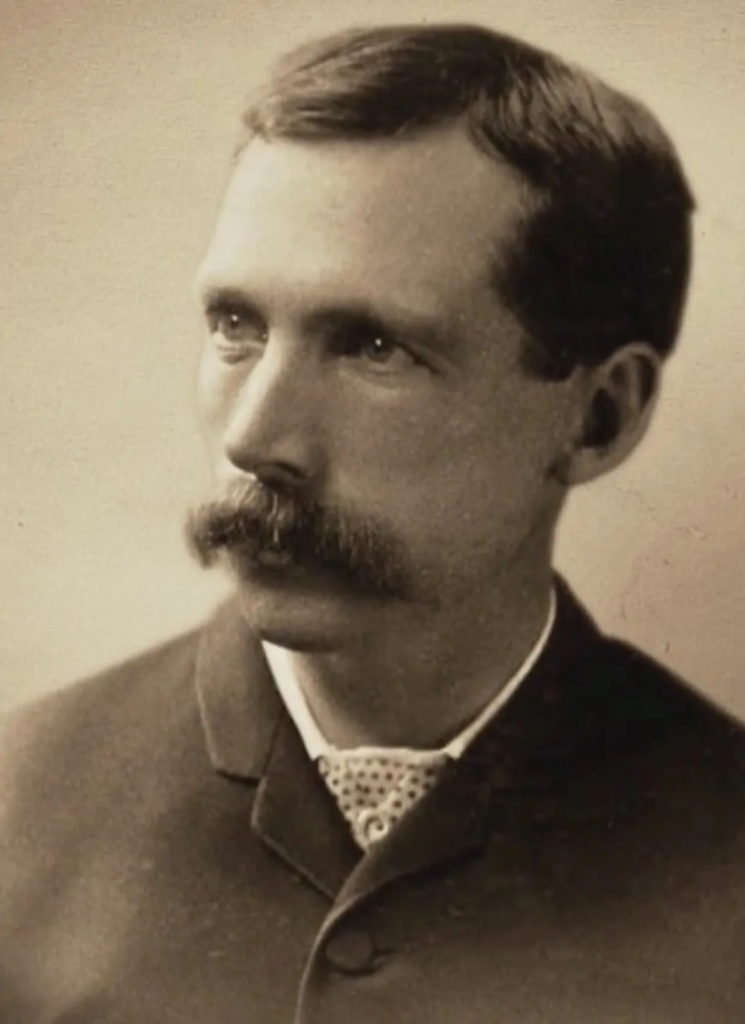
One of the first jobs that he was given was to investigate an issue that had that had arisen in the country’s Indian residential schools. Apparently, it seemed that a lot of the children who were being placed in these schools were dying. We are talking of a death rate among students that averaged at that time about 50%. Yes, you heard that right. About half of the children being sent to those schools were not surviving. In some schools, the death rate was as high as 69%.
So, Bryce went to work to try and get to the bottom of this mystery. He came back a few years later with a well researched report in which he laid the blame for the unconscionable death toll of the residential schools primarily on the federal government for its failure to enforce even a minimal level of health standards in the schools. Bryce had held a plumb line up against the entire system and revealed that the wall was completely off-kilter. And he apparently thought that he had finished his work. He had identified the problem and fully documented it. Now that the government knew what the problem was, surely they would just fix it.
Duncan Campbell Scott

But any guesses what happened when Bryce submitted his report? He was confronted by his own Amaziah in the form of Duncan Campbell Scott, the head of Indian Affairs, a man who declared that it was his job to “get rid of the Indian problem,” and was apparently quite comfortable with doing that by killing about half of the indigenous children who came into the government’s care. When Scott saw the report and conclusions that Bryce had come to, he quickly sprang into action. He dismissed the report and immediately cut all of Bryce’s funding. From there, Scott and the government set about destroying Dr. Bryce’s career, preventing him from speaking at conferences and eventually pushing him out of the public service altogether.
Bryce’s Response

But what was Bryce to do? This had become a political hot potato and he was no politician nor a politician’s son. He was just a doctor and a man of faith (a Presbyterian, in fact) and he had seen the plumb line. He knew that he could not remain silent. When all political action was closed off to him, he chose to speak in a different way. He wrote a book, “The Story of a National Crime: An Appeal for Justice to the Indians of Canada.” He got it published and began distributing it himself, particularly handing out many copies of the book throughout Ottawa. He knew what he had seen, and he was committed to get the word out about what he had seen no matter what the cost to himself.
That – that kind of courage and commitment to speaking the truth – is, I believe, what our passage in the Book of Amos this morning is about. I think Amos makes it clear that prophets – true prophets of the – are not special people with unique gifts or insights. They are ordinary people – herders, sycomore tree dressers, doctors and engineers. They are any one of us, whatever we may do, but they are people who have seen the plumb line and know the danger that the system is in. They are, above all, people who have the courage to speak up and say what they have seen. That, my friends, can and should be any one of us.
The Idea of a Nation
Watch the sermon video here:
Hespeler, July 4 2021 © Scott McAndless
2 Samuel 5:1-5, 9-10, Psalm 48, 2 Corinthians 12:2-10, Mark 6:1-13 (click to read)
Did you notice something as we read from the Old Testament this morning? I don’t know about you, but for me it was unmistakable. Something changed; something just clicked. Now, I will admit that maybe it was just me. Maybe the click just happened in my own head and it was so loud that I thought everyone could hear it. Because, you see, I am a bit of a historian. I actually have a bachelor degree in history. That does give me an awareness of something that others might not notice. And what I noticed, as I read this passage, was that we had suddenly entered an era of documented history.
Independent Confirmation
You see, when it says, “So all the elders of Israel came to the king at Hebron; and King David made a covenant with them at Hebron before the Lord, and they anointed David king over Israel,” there is something different about that statement from any other biblical statements that go before it. You see, David is the first person in the Bible for whom we have independent confirmation of his existence. That is to say, he is the first individual in the Bible for whom we have extra-biblical evidence. I mean, there have been some archaeological discoveries that confirm a few things older than David – the existence of certain cities or population groups – but nothing that you could use as evidence that a certain person existed.
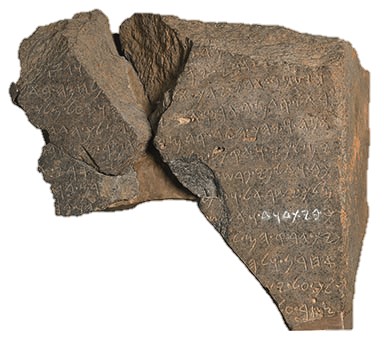
But, for David, we have that. We don’t exactly have proof of the existence of David himself, but there are ancient inscriptions that have been uncovered that refer to something called the House of David. So we know for sure that there was a dynasty of ancient kings who traced the foundation of their rule to a man named David. That is about all we can prove about the man, and I know that might not seem like much, but it’s really quite significant for that time and place.
The City of David
And there is a little bit more that we can say. Our reading goes on to describe how “David occupied the stronghold, and named it the city of David. David built the city all around from the Millo inwards.” As you read on, it becomes clear that this is a reference to David establishing his capital at a little place called Jerusalem. You might have heard of it.
And archaeologists have found evidence of some ancient construction near the top of Mount Zion in Jerusalem that seems to correspond to that period of time. In particular, they have discovered a large retaining wall that they have identified as the Millo that is mentioned in this passage. It was apparently considered to be quite an engineering feat at the time as it is mentioned several times in the Bible.
Even a Date
And if you put all of that together, we actually even have a date. If David is the guy responsible for the construction of what is called the City of David, then we can say that he must have ruled in Jerusalem in about the year 1,000 BC. If you ever want to impress people at a party with your biblical knowledge, pull out that one! It’s easy to remember and the first confirmed date in the Bible: 1,000 BC.
Now, some of you – maybe especially those of you who don’t get excited by history – may be saying “So what? What does it matter that something has been confirmed by extra-biblical sources? After all, just because something isn’t mentioned outside of the Bible doesn’t mean that it didn’t happen.” And, yes, that is absolutely true. But it does mean something. It means that, with the story of David, we finally have something concrete that we can hold up and compare to the biblical account.
The Traces of David’s Kingdom

The Bible does say many things about the rule of King David. Of course, we are not going to find historical evidence for every little detail, but we should be able to find some corroboration. In particular, the Bible says that David established a very large kingdom that united all of the tribes of Israel over a large territory for the very first time – a united kingdom that endured during his life and the life of his son Solomon before coming apart and never being reunited. Now that is an enormous achievement for that time and place.
What’s more, it is the kind of administration that you might expect to leave significant traces in the archaeological record. If there was such a united kingdom in David’s time, we ought to be able to find the traces of it. And so, of course, archaeologists have searched for those traces. And, news alert, they haven’t found them.
On the contrary, they find that there was very little in the way of political unity in the area at the time. As a result, most scholars and archaeologists would say that the evidence seems to indicate that, if David was a real person and he ruled in Jerusalem, his kingdom was probably more of a chieftainship and likely didn’t extend all that far from Mount Zion. It seems that, as time went by, kings in the line of David looked back on the time of David and Solomon as a great golden age and so, kind of naturally, they exaggerated the size and importance of that kingdom.
The Idea of a United Kingdom
So there really is little evidence of a united kingdom under David. But I will tell you something that there is a lot of evidence for, and that is for the idea of that united kingdom. For much of its history after 1,000 BC, there were two kingdoms in the land of Israel – the Kingdom of Israel in the north and the Kingdom of Judah in the south. And for much of that time, the northern kingdom was by far the largest, strongest and most prosperous of the two. The kingdom of Judah in the south was really a runt of a kingdom. But the southern kingdom had Jerusalem and it had the House of David in charge.
And it seems clear that the idea that there had been a united kingdom under the rule of David and Solomon was established and grew in that southern Kingdom of Judah. Based on this idea, yes, the rulers of the House of David did claim that they should also rule over the people in the north. This claim became even more insistent when the northern kingdom was destroyed by the Assyrian Empire and, in a seeming miracle, the southern kingdom just barely managed to survive.
At that time, prophets such as the great Prophet Isaiah proclaimed that the time had finally come to re-establish the united kingdom, though it never actually happened. Over time, the idea of a united kingdom became linked to the idea that the temple in Jerusalem was the only place where people could correctly worship Yahweh, the God of Israel.
The Idea Outlives the House of David
The idea of the united kingdom continued even once the ruling House of David ceased to exist after the Babylonian exile. When the exiles returned from Babylon, many of them returned with the idea that God had sent them back to rebuild the old kingdom of David, even if it didn’t really work out that way. Centuries later, the Hasmonean kings, who did not claim to be descended from David, still wanted to re-establish his kingdom and entered into a war of conquest to bring Galilee under Judean control.
In fact, to this very day the idea of David’s kingdom has been a driving force behind the modern Israeli state, especially in the establishment of Israeli settlements in occupied territory. Of course, this has often rendered the hope for peace in that part of the world somewhat complicated.
So, it is kind of amazing, when you think about it, that the very idea of the kingdom of David and Solomon had more influence on the future course of history than did the actual reality of those kingdoms on the ground. But, as I think of it, maybe that is not so strange after all. In fact, I think that is how it always works and it’s not necessarily a bad thing.
National Days of Celebration
We gather today just three days after Canada Day, and we also gather on the American Independence Day. And there has been a lot of discussion this year about how or even if people ought to celebrate Canada Day, especially because, over the last couple of months, we have been confronted in a particularly graphic way with some of the failures and shortcomings of our country, particularly in regards to our relationship with indigenous people and the residential school system. And there doesn’t seem to be anything to celebrate about that.
As for our good American neighbours, I’m quite sure that they would never tone down their patriotic celebrations today, but there is no doubt that the past year may have tarnished the image that many of them have of their country when you think of the events that prompted the Black Lives Matter movement, a terrible pandemic experience and an insurrection at the nation’s capital.
As I think of these celebrations and of how the idea of David’s kingdom was bigger than the kingdom itself probably was, it makes me ask the question today, what exactly do we celebrate when we celebrate a nation?
Looking Critically at our Past
I know there are some who really struggle with the idea of looking at our past with a critical eye. This is because we have long associated the idea of our country with a glorified view of that past. We have looked to stories of heroic settlers heading out into the clearings, to visionary leaders like John A. Macdonald and Edgerton Ryerson, to brave leaders like Generals Wolf and Brock to tell us who we were and what we stood for.
But, if that is who we are, that makes any act of looking critically at those heroes feel very dangerous. It makes any act of looking back feel dangerous because very few people or policies of the past will stand up against our present-day sensibilities. So, all of a sudden, indigenous people asking to have their experiences heard and validated or maybe just historians doing their jobs feels like people are attacking our patriotic spirit. But I do not believe that we should be afraid of history, and we certainly should not be afraid of the truth of our history.
In many ways, our idea of our country has been based on an idealized picture of our past, as romanticized, in some ways, as the united kingdom under David. But just because that past was not as ideal as we may have thought it was, just because it turns out that we may have blinded ourselves to some of its flaws, does that mean that the idea does not have a purpose?
An Idea of Canada

I do have an idea of a Canada – a Canada that takes care of its people, all of its people. I have an idea of a Canada where we do not value people less because of their race or their origins. I have an idea of a country where we value and care for the land and honour those who have lived in relationship with it for thousands of generations. That is my idea of Canada. I suspect that it is God’s idea as well.
Did that ideal Canada exist in the past? No, certainly not in entirety and there have been many cases when we fell far, far short of that idea. Does that ideal Canada exist in the present? Well, I’m afraid I have to say that the answer there is also no. But that doesn’t mean that it’s not the real Canada. The idea is real and, if we commit ourselves and if we work at it, if we really work at it, that idea will begin to align more closely to the reality on the ground in the future because, I believe, that is where my idea of Canada will be found – in the future, and in my heart. Where will yours be found?
